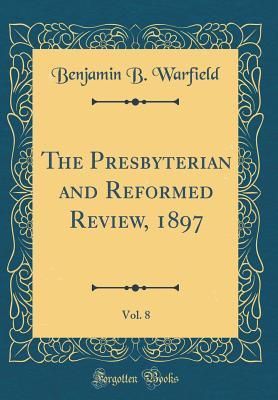- Bíblia
- Leia a Bíblia
- Versões da Bíblia
- Verso do dia
- Planos de Leitura
- Versos por Tópico
- Books of the Bible
- Imagens bíblicas
- Estude
- Comentários
- Concordâncias
- Dicionários
- Enciclopédias
- Sermões
- Bible Atlas & Maps
- BP Wiki
- Devocionais
- Devocionais de hoje
- Light of the World
- Todos os devocionais
- Inspirational Quotes
- Mais
- Picture Quotes
- Videos
- Inspirador
- Estudo da Bíblia
- O que a Bíblia diz
- Bible Q&As
- Daily Bread
- Bible by Genre
- Bible Stories
- Random Bible Verse
- Comunidade
- Store
The Presbyterian and Reformed Review, 1897, Vol. 8 (Classic Reprint)
by Benjamin B. Warfield
Excerpt from The Presbyterian and Reformed Review, 1897, Vol. 8
Such is. The testimony of the contemporary best fitted to judge the achievement of this youth in his twentieth year. Naturally Melanchthon was greatly pleased by the notice takeniof him bv Erasmus, and responded by celebrating the learning Of his patron in Greek verse. He was already lecturing on classical literature in the young but vigorous university which Duke Eberhard had founded with imperial sanction at Tubingen in 1477. He was also hard at work upon the characteristic task Of annotating Terence and Plutarch, and preparing a brief and convenient grammar Of the Greek language. This grammar, which was published in 1518 was an epoch-making book and generations of German youth found it the gateway to the fascinating fields Of Greek life and thought.
About the Publisher
Forgotten Books publishes hundreds of thousands of rare and classic books. Find more at www.forgottenbooks.comwww.forgottenbooks.com
This book is a reproduction of an important historical work. Forgotten Books uses state-of-the-art technology to digitally reconstruct the work, preserving the original format whilst repairing imperfections present in the aged copy. In rare cases, an imperfection in the original, such as a blemish or missing page, may be replicated in our edition. We do, however, repair the vast majority of imperfections successfully; any imperfections that remain are intentionally left to preserve the state of such historical works.
Such is. The testimony of the contemporary best fitted to judge the achievement of this youth in his twentieth year. Naturally Melanchthon was greatly pleased by the notice takeniof him bv Erasmus, and responded by celebrating the learning Of his patron in Greek verse. He was already lecturing on classical literature in the young but vigorous university which Duke Eberhard had founded with imperial sanction at Tubingen in 1477. He was also hard at work upon the characteristic task Of annotating Terence and Plutarch, and preparing a brief and convenient grammar Of the Greek language. This grammar, which was published in 1518 was an epoch-making book and generations of German youth found it the gateway to the fascinating fields Of Greek life and thought.
About the Publisher
Forgotten Books publishes hundreds of thousands of rare and classic books. Find more at www.forgottenbooks.comwww.forgottenbooks.com
This book is a reproduction of an important historical work. Forgotten Books uses state-of-the-art technology to digitally reconstruct the work, preserving the original format whilst repairing imperfections present in the aged copy. In rare cases, an imperfection in the original, such as a blemish or missing page, may be replicated in our edition. We do, however, repair the vast majority of imperfections successfully; any imperfections that remain are intentionally left to preserve the state of such historical works.
BUY NOW
Hardcover, 180 pages
Published May 1st 2018 by Forgotten Books
Se inscrever
© 2025 Bibleportal.com Todos os direitos reservados.

Benjamin Breckinridge Warfield was professor of theology at Princeton Seminary from 1887 to 1921. Some conservative Presbyterians consider him to be the last of the great Princeton theologians before the split in 1929 that formed Westminster Seminary and the Orthodox Presbyterian Church.
Warfield entered Princeton University in 1868 and graduated in 1871 with high honors. Although Warfield studied mathematics and science in college, while traveling in Europe he decided to study theology, surprising even many of his closest friends. He entered Princeton Seminary in 1873, in order to train for ministry as a Presbyterian minister. He graduated in 1876. For a short time in 1876 he preached in Presbyterian churches in Concord, Kentucky and Dayton, Ohio as a "supply pastor". In late 1876 Warfield and his new wife moved to Germany where he studied under Ernst Luthardt and Franz Delitzsch. Warfield was the assistant pastor of First Presbyterian Church in Baltimore, Maryland for a short time. Then he became an instructor at Western Theological Seminary, which is now called Pittsburgh Theological Seminary. He was ordained on April 26, 1879.
During his tenure, his primary thrust (and that of the seminary) was an authoritative view of the Bible. This view was held in contrast to the emotionalism of the revival movements, the rationalism of higher criticism, and the heterodox teachings of various New religious movements that were emerging. The seminary held fast to the Reformed confessional tradition — that is, it faithfully followed the Westminster Confession of Faith.
Warfield's view of evolution may appear unusual for a conservative of his day. He was willing to accept that Darwin's theory might be true, but believed that God guided the process of evolution, and was as such an evolutionary creationist.
... Show more